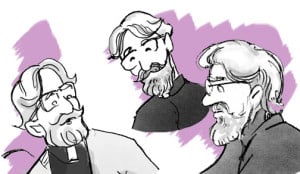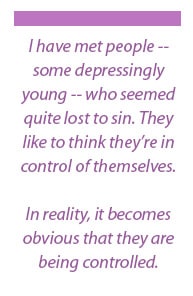Thank goodness! After rocketing along for the last three or four chapters, we finally get to the relative peace and quiet of a Sunday at church, a few days after Xenia’s harrowing adventures. (By the way, one reader told me that he couldn’t put the book down for the last 300 pages. I thought it was one of the nicest compliments I’ve ever gotten.)
Xenia has been through a lot, so it’s good to find that she is back on her feet, more or less. Her sensational story has been all over the news, but she isn’t really cut out to be a media darling. CJ and his mother are re-united (and much more willing to be media darlings). The cute little twin girls are back with their family. So in most ways, all’s well.
But is it, really? Xenia is able to chat with Fr. Andrew and Jake about how things have gone, and she even applies a little leverage to get the ledger returned the way her dad wanted. But underneath all this, she’s not quite satisfied, and eventually, she needs to know from Jake how Charlie is doing.
This, I always thought, was going to be a difficult part of the story. I have seen mysteries and crime dramas where the author will call on a significant amount of poetic license to get to some kind of happy ending where anyone who has become a sympathetic figure is freed without charge, no matter what crimes they’ve committed. I don’t know if I’m more harsh than those authors, or just more realistic. But I could never see my way to painting that picture. I can’t pretend to have an exact idea what would happen. But it stands to reason that Charlie would be kept in isolation at the very least. By his own admission, he was complicit in a number of abductions and other crimes. He was being controlled by someone else, but that would be an imperfect defense. It’s far from clear the criminal justice system would do with him. But besides all that, what is his mental and emotional state? How much regret does he feel? How is he coping?
Detective Hastern can give us the basic idea of how things are with Charlie.
“Can you tell me how he’s doing?” she asked.
Jake’s businesslike expression softened. “He’s doing okay, Xenia. As well as could be expected, under the circumstances. He’s stronger than his father thought.”
She looked unconvinced, and he gave her a searching glance before answering more honestly. “He’s struggling. The post-traumatic stress is much worse for him than you — nightmares, flashbacks, emotional outbursts. He’ll suddenly go ballistic because he’s convinced that the twins aren’t safe. … I think he’s going to make it. But he might have a hard time of it for a bit.” (page 429)
Making sense of things with Father Andrew
 The situation with Charlie is heart-breaking, really. Apparently, all of that has been weighing on Xenia. It’s telling that after the conversation with Jake, she goes into a bit of a funk. Father Andrew manages to break through with a strategic comment, and we get to the part of things where just he and Xenia can talk . She isn’t ready to get to the point immediately, though, and so they spend a little time just talking about her discomfort with the strange media circus.
The situation with Charlie is heart-breaking, really. Apparently, all of that has been weighing on Xenia. It’s telling that after the conversation with Jake, she goes into a bit of a funk. Father Andrew manages to break through with a strategic comment, and we get to the part of things where just he and Xenia can talk . She isn’t ready to get to the point immediately, though, and so they spend a little time just talking about her discomfort with the strange media circus.
That is natural for someone like Xenia, but it’s also a bit of a false front, and Fr. Andrew is discerning enough to see through it. Privately, Xenia must’ve been weighing the events that happened out at the Rogers’ farm. And she has already had a chance to talk to Fr. Andrew once — apparently, she filled him in on the basic facts. But she’s not ready to discuss them in more detail yet. She veers off instead into just not feeling the part of the hero the news programs make her out to be.
“I was supposed to become a better person. Get along with people. Love my neighbor. Preach the Gospel without words. And I did all that research — tried to learn about saints, pray more, pay more attention in church. I thought it would help, but it didn’t.”
“It didn’t?” Fr. Andrew asked lightly.
“Well … no,” she said with a frown. And then, with less assurance, “Did it?”
“Stop and think about it, Xenia. You went from pushing little children out of the way during a fire alarm to risking your own life to rescue four people. So, it’s possible that what you were doing made more of an impact than you thought.” (pages 432-433)
That’s not the biggest point in this chapter, but it’s something subtle that I like. The truth about so many self-conscious “programs” we set out on is that they can seem almost ridiculous at times. Xenia was supposed to address real problems with empathy, and she went off to a bunch of websites and podcasts. We fall into that kind of trap easily. Because those are the sorts of things that are easy to do — it’s much harder to really make a change for the better. But if it’s the best we have to offer, and if we just stick with it with faith and grit, God may well bless the efforts in ways we can’t easily see. In Xenia’s case, that was certainly true. At the beginning of the book, it’s almost a joke to think that she could ever be Xenia the Warm-hearted. By the end, I hope that it’s apparent that’s exactly who she is.
Having gotten past Xenia’s reluctance, Fr. Andrew can direct her attention to something else that’s very important about what happened on that afternoon. Saving CJ and the twins was heroic. But going back in to save Charlie was an act of true Christian charity. That was what she needed the extraordinary help to do. That was what brought her to her real moment of truth. And in the end, that was what required a kind of miracle.
” … when you went back for Charlie, you went beyond what is natural. Given Charlie’s treatment of you and what you knew about Dennis Rogers, no one would have blamed you for staying as far away as possible. But instead of just being terrified, you were moved to the kind of compassion that comes from a much more powerful source than ordinary sympathy or courage. The strength to risk everything — even go into hell itself — if it means you can save someone. That’s the love of Christ that still saves the world, every minute of every day. And you extended it to Charlie.” (page 435)
Fr. Andrew circles back to the theme he had covered with her earlier — of this experience really being an encounter with the evil that is present in our fallen world. And it’s in light of these comments that we can touch on one of the other big points coming out of this chapter. Father Andrew reminds Xenia that her friend Jason had been showing his fallenness in a lot of little things, before he made his one disastrous choice. But Charlie lived a very different life — little of what happened to him seemed like his choice. That brings us to a central question.
Who is Charlie, really?
I made a conscious decision not to put Charlie in the kind of situation we might hear on the news. The life he lives is terribly hard, but it bears no resemblance to the shocking stories of abductions or human trafficking. That’s because I never wanted this to seem like an awareness campaign. For one thing, I have no authority to speak on such a difficult subject. But more importantly, there was a symbolism I was going for that really didn’t have to do with those situations.
You get a hint of that in this comment from Father Andrew. Speaking of Charlie’s life, he says: “That is certainly one of the most abusive situations I’ve ever heard of. But there are a lot of enslaved people out there. It’s just that it’s not usually so obvious. (page 435).”
 The enslavement he’s talking about — and what I was trying to get at — isn’t actual. I’m talking about the enslavement to sin. That is who Charlie represents. An individual whose humanity has been all but subsumed by a besetting sin. It can be something dramatic and obvious like an addiction to drugs or alcohol or pornography. However, it can also be things that are much harder to spot. I leave it to more gifted and authoritative voices to talk expansively on this subject. We all know something of what it is to fall into sin. But we “fall and get up, fall and get up,” as the monks say. Some people don’t. They may fall and stay down.
The enslavement he’s talking about — and what I was trying to get at — isn’t actual. I’m talking about the enslavement to sin. That is who Charlie represents. An individual whose humanity has been all but subsumed by a besetting sin. It can be something dramatic and obvious like an addiction to drugs or alcohol or pornography. However, it can also be things that are much harder to spot. I leave it to more gifted and authoritative voices to talk expansively on this subject. We all know something of what it is to fall into sin. But we “fall and get up, fall and get up,” as the monks say. Some people don’t. They may fall and stay down.
I have met people — some of them were depressingly young — who seemed quite lost to sin. If you know the type of thing, you don’t forget it. You feel as though this is a person who only thinks they are in control of themselves. They cherish the appearance of freewill. But the more you know them, the more you realize that they are actually a prisoner. They may have terrible demons, and they may hate what they are driven to do. But if they will not fight — actually fight — what’s happening to them, they may never break free.
Do we see now what was going on, at the Rogers farm? Charlie found the strength to give Xenia a clue, in order that the children would be rescued. He had enough conscience for that. What he wasn’t prepared for, however, was for her to come back, and for the evil that controlled him (Rogers, who is little better than a demon) to suddenly put her in danger. It is the only thing that breaks the grip that Rogers has on him. Charlie nearly succumbs, one last time, when Rogers begins to hurl the kind of verbal abuse that has worked before. He tells Charlie that he’s worthless, that other people are disgusted by him. Charlie is so overwhelmed by habitual surrender that he comes close to giving his father the key — letting the demon out of the cage. But Xenia intervenes, one last time. She tells a lie that gives Charlie the push he needs to break the demon’s hold and take hold of something real. That last vestige of humanity in him finds something to hold onto. And he doesn’t let go. Xenia saved him. He saved her.
These are powerful things, and they do actually happen. Maybe not as obviously and dramatically as this, of course, but what is fiction for, if not to give us the enhanced view?
There are other points to this chapter, and to the book. Things that I could mention about miracles, and friends, and dads. But I think those all speak for themselves. This point is the biggest deal, for me, at least. If we call ourselves Christians, we have to understand that we are saved by the grace of God, and then go about the business of saving each other by the grace of God.
So what can become of Charlie, once all this is befallen him? We’ll find out next time. The next chapter finishes out the book — join me there.
Friday: Epilogue — last things and first things
